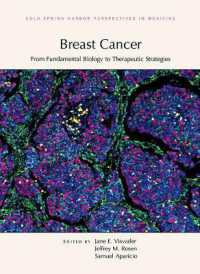- ホーム
- > 洋書
- > 英文書
- > Philosophy
Full Description
Is science getting at the truth? The sceptics - those who spread doubt about science - often employ a simple argument: scientists were 'sure' in the past, and then they ended up being wrong. Through a combination of historical investigation and philosophical-sociological analysis, Identifying Future-Proof Science defends science against this potentially dangerous scepticism. Indeed, we can confidently identify many scientific claims that are future-proof: they will last forever, so long as science continues. How do we identify future-proof claims? This appears to be a new question for science scholars, and not an unimportant one. Peter Vickers argues that the best way to identify future-proof science is to avoid any attempt to analyse the relevant first-order scientific evidence, instead focusing purely on second-order evidence. Specifically, a scientific claim is future-proof when the relevant scientific community is large, international, and diverse, and at least 95% of that community would describe the claim as a 'scientific fact'. In the entire history of science, no claim meeting these criteria has ever been overturned, despite enormous opportunity.
Contents
Preface
List of Figures
1: What is future-proof science?
2: The historical challenge to future-proof science: the debate so far
3: Meckel's successful prediction of gill slits: a case of misleading evidence?
4: The Tiktaalik 'missing link' novel predictive success and the evidence for evolution
5: The judgement of the scientific community: lessons from continental drift
6: Fundamental physics and the special vulnerability to underdetermination
7: Do we know how the dinosaurs died?
8: Scientific knowledge in a pandemic
9: Core argument, objections, replies, and outlook
Bibliography
Index






